
|
The international
guide to Jamaican restaurants and Caribbean restaurants |
Jamaican Foods-- Page
Two
Jamaican cuisine is healthy because
it is made with many unprocessed foods, uses smaller portions
of meats, has a high content of fish, beans, and vegetables,
and, most of all, because it is an eclectic mix of the best that
African, European, Indian, and Chinese cuisines have to offer.
Moreover, Jamaicans have always been aware of the relationship
between food and health. Perhaps Jamaican cuisine is healthy
due to luck or happenstance. How else can anyone explain why
some of the most highly rated medicinal herbs, e.g., ginger,
garlic, all spice and hot peppers just happen to be the basic
seasonings used in Jamaican cuisine.
In this section we will provide
information on some of the benefits of some common Jamaican foods.
Avocados 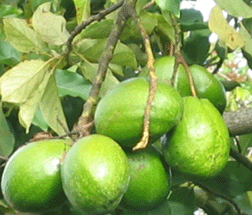 |
|
|
In Jamaica, avocados are often
eaten with bread, especially hard dough bread, with bullas (a
round basic firm sweet cake, in which stale bread is often an
ingredient), in vegetable salads, and as a side dish with meals.
When eaten with bread and bulla avocados function as cheese or
butter. When eaten in a salad or as a side dish avocados are
treated as a vegetable. In some other places, avocados are often
treated as fruits and are often used in drinks. Avocados are
native to Mexico, Central America and the Caribbean.
Avocados are healthful: High avocado intake has been shown to
have a beneficial effect on blood serum cholesterol levels. "Specifically,
after a seven day diet rich in avocados, hypercholesterolemia
patients showed a 17% decrease in total serum cholesterol levels.
These subjects also showed a 22% decrease in both LDL (bad cholesterol)
and triglyceride levels and 11% increase in HDL (good cholesterol)
levels." Moreover, "Approximately 75% of an avocado's
calories come from fat, most of which is monounsaturated fat.
Avocados also have 60% more potassium than bananas. They are
rich in B vitamins, as well as vitamin E and vitamin K. They
have the highest fiber content of any fruit - including 75% insoluble
and 25% soluble fiber." (This
information draws heavily on Wikipedia's excellent article.)
According to Wikipedia, “The avocado
is very popular in vegetarian cuisine, making an excellent substitute
for meats in sandwiches and salads because of its high fat content.
The fruit is not sweet, but fatty, distinctly yet subtly flavored,
and of smooth, almost creamy texture. It is used as the base
for the Mexican dip known as guacamole, as well as a filling
for several kinds of sushi, including California rolls. Avocado
is popular in chicken dishes and as a spread on toast, served
with salt and pepper. In Brazil and Vietnam, avocados are frequently
used for milk-shakes and occasionally added to ice cream and
other desserts. In Brazil, Vietnam. The Philippines and Indonesia,
a dessert drink is made with sugar, milk or water, and pureed
avocado. Chocolate syrup is sometimes added. In Australia it
is commonly served in sandwiches, often with chicken. In Ghana,
it's often eaten alone in sliced bread as a sandwich. . .The
avocado flesh oxidizes and turns brown quickly after exposure
to air. To prevent this, lime or lemon juice can be added to
avocados after they are peeled.” |
|
Cassava or Yucca
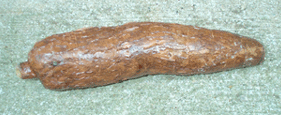
Simple Cassava
Bread Recipe
Cassava or Yucca (also known as manioc and is used to
make tapioca) can help prevent heart disease, reduce the risk
of cancer, prevent cataracts, and help keep skin smooth. While
cassava is not well known in the US it is the world's number
two vegetable crop, after potatoes. Cassava is uniquely laden
with iron plus vitamin C which you need to help your body to
absorb iron. It is also a good source of magnesium which helps
to protect your heart, bones, arteries and blood pressure. A
half cup of cooked cassava contains 13 percent of the Recommended
Daily Allowance (RDA) for women and 30 percent for men. And because
it also contains 35 percent of the daily value of vitamin C,
the iron in cassava is much easier to absorb. Cassava is also
glutin free and can be helpful to those sufering from
celiac
disease and dermatitis herpetifomis.
Sweet Potatoes
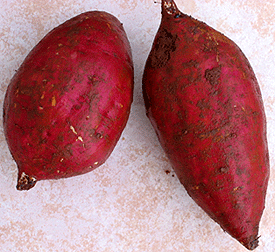
Plantains
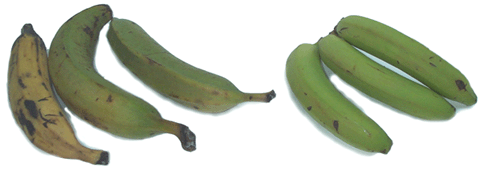
plantains
bananas
Plantains can help lower blood pressure,
prevent and treat ulcers, prevent constipation, decrease the
risk of hear disease. While plantains look like large bananas
they are as different as apples and oranges. Unlike bananas,
plantains need to be cooked before they are eaten. Plantains
also pack different nutrients. Ounce for ounce, plantains contain
more potassium than bananas. That means a plateful of plantains
will reduce high blood pressure. One cup of cooked plantains
contain 716 milligrams of or 20 percent of the daily value of
potassium. And potassium is well established as a key mineral
for heart disease prevention. Studies show people whose diets
are low in potassium are at higher risk for high blood pressure,
heart attacks, and strokes. A cup of cooked plantains provide
about 49 milligrams of magnesium, or more than 12 percent of
the daily value. Magnesium is another mineral that can help lower
blood pressure, especially among people who are sensitive to
sodium. Therefore, next time you are at your favorite Jamaican
eatery, load up on those plantains. (Source: The Doctors Book
of Food Remedies, 1998 Rodale Inc.)
Chocho (christophine)
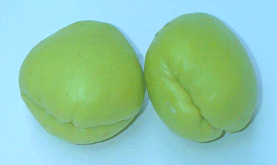
Coco (eddo)
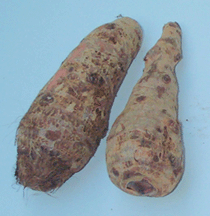
Jamaican Yams

Ripe plantains
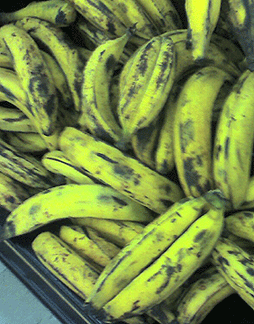
Go to Jamaican Foods
page 1
Go to Jamaican Foods
page 3
|
International Pages |
USA Pages |
Phone: 206-339-9034
Fax: 206-339-9034
E-mail: eatjamaican@eatjamaican.com
©eatjamaican.com,
2015
|


